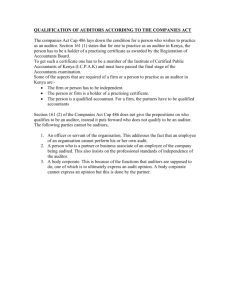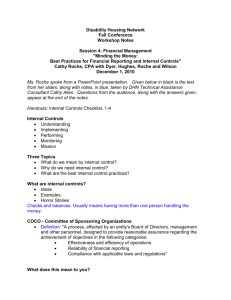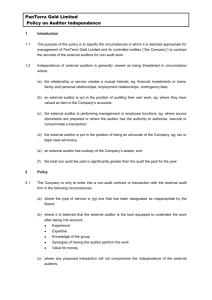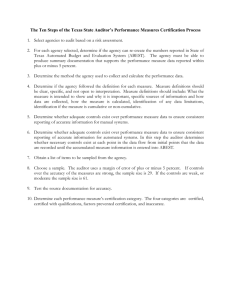EXHIBIT A
advertisement
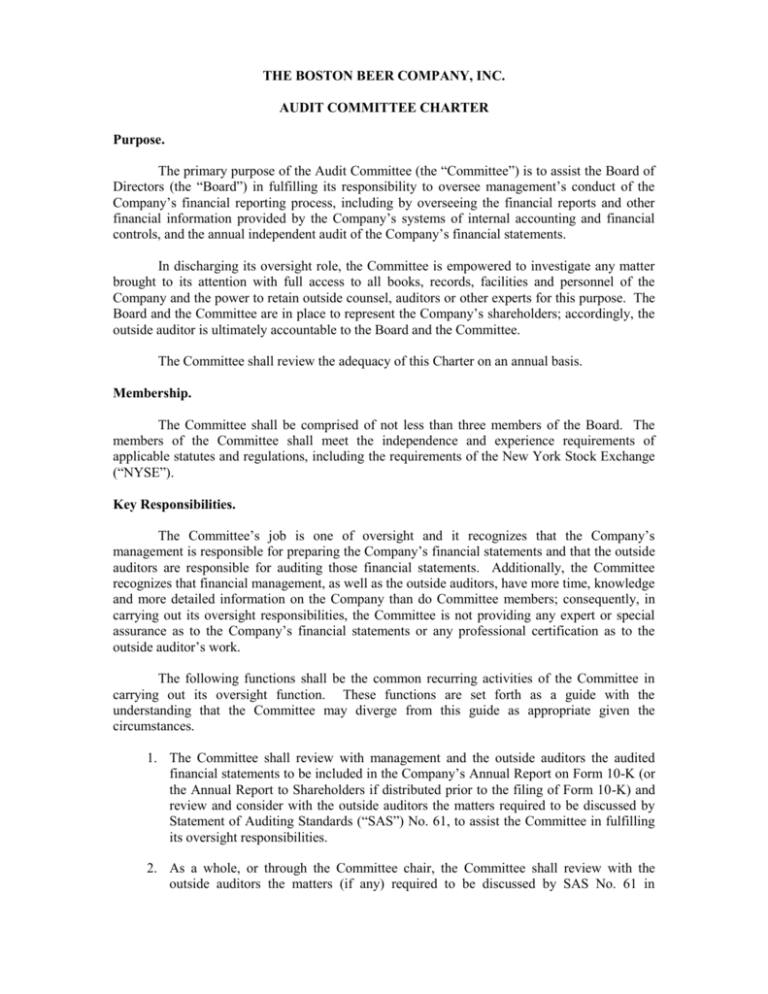
THE BOSTON BEER COMPANY, INC. AUDIT COMMITTEE CHARTER Purpose. The primary purpose of the Audit Committee (the “Committee”) is to assist the Board of Directors (the “Board”) in fulfilling its responsibility to oversee management’s conduct of the Company’s financial reporting process, including by overseeing the financial reports and other financial information provided by the Company’s systems of internal accounting and financial controls, and the annual independent audit of the Company’s financial statements. In discharging its oversight role, the Committee is empowered to investigate any matter brought to its attention with full access to all books, records, facilities and personnel of the Company and the power to retain outside counsel, auditors or other experts for this purpose. The Board and the Committee are in place to represent the Company’s shareholders; accordingly, the outside auditor is ultimately accountable to the Board and the Committee. The Committee shall review the adequacy of this Charter on an annual basis. Membership. The Committee shall be comprised of not less than three members of the Board. The members of the Committee shall meet the independence and experience requirements of applicable statutes and regulations, including the requirements of the New York Stock Exchange (“NYSE”). Key Responsibilities. The Committee’s job is one of oversight and it recognizes that the Company’s management is responsible for preparing the Company’s financial statements and that the outside auditors are responsible for auditing those financial statements. Additionally, the Committee recognizes that financial management, as well as the outside auditors, have more time, knowledge and more detailed information on the Company than do Committee members; consequently, in carrying out its oversight responsibilities, the Committee is not providing any expert or special assurance as to the Company’s financial statements or any professional certification as to the outside auditor’s work. The following functions shall be the common recurring activities of the Committee in carrying out its oversight function. These functions are set forth as a guide with the understanding that the Committee may diverge from this guide as appropriate given the circumstances. 1. The Committee shall review with management and the outside auditors the audited financial statements to be included in the Company’s Annual Report on Form 10-K (or the Annual Report to Shareholders if distributed prior to the filing of Form 10-K) and review and consider with the outside auditors the matters required to be discussed by Statement of Auditing Standards (“SAS”) No. 61, to assist the Committee in fulfilling its oversight responsibilities. 2. As a whole, or through the Committee chair, the Committee shall review with the outside auditors the matters (if any) required to be discussed by SAS No. 61 in connection with the interim financial reviews conducted by the outside auditors to assist the Committee in fulfilling its oversight responsibilities; this review will occur prior to the Company’s filing of the Form 10-Q. 3. The Committee shall receive from time to time the outside auditor reports concerning: a. all critical accounting policies and practices to be used; b. all alternative treatments of financial information within generally accepted accounting principles that have been discussed with management of the Company, ramifications of the use of such alternative disclosures and treatments, and the treatment preferred by the registered public accounting firm; and c. other material written communications between the registered public accounting firm and the management of the Company, such as any management letter or schedule of unadjusted differences. 4. The Committee shall discuss with management and the outside auditors: a. the accounting policies of the Company which may be viewed as critical; the nature and extent of any significant changes in accounting principles or the application thereof; significant judgment areas; significant risks and exposures and the steps management has taken to minimize such risks to the Company; and the quality and adequacy of the Company’s internal controls, accounting policies and estimates; b. the terms and effects of any transactions with parties related to the Company which are significant in size or which involve terms or other aspects which differ from those which would likely be negotiated with an unaffiliated third party and which are material to an understanding of the Company’s financial statements; and c. the existence of any off-balance sheet structures (which are prohibited under the Company’s Code of Business Conduct and Ethics), including financing arrangements, and their potential impact on the Company and its financial statements. 5. The Committee shall: a. request from the outside auditors annually, a formal written statement delineating all relationships between the auditor and the Company consistent with Independence Standards Board Standard Number 1; b. discuss with the outside auditors any such disclosed relationships and their impact on the outside auditor’s independence; c. take appropriate action to oversee the independence of the outside auditor; d. preapprove all auditing and non-audit services provided to the Company by the outside auditor. The Committee may delegate to one of more of its members the authority to grant such preapprovals. Preapprovals granted by 2 any such delegate shall be presented to the full Committee at its next scheduled meeting; and e. establish procedures for: i. accounting the receipt, retention, and treatment of complaints received by the Company regarding accounting, internal accounting controls, or auditing matters; and ii. the confidential, anonymous submission by employees of the Company of concerns regarding questionable or auditing matters. 6. The Committee shall have sole authority to appoint or replace the outside auditor, to determine all compensation to be paid to the outside auditor and to oversee the work of the outside auditor (including resolution of disagreements between management and the outside auditor regarding financial reporting). The outside auditor shall report directly to the Committee. 7. The Committee shall have sole authority to appoint or replace the outside auditor for the Company’s retirement plan and such other health and welfare plan that may require the services of an outside auditor, to determine all compensation to be paid to the outside auditor and to oversee the work of the outside auditor (including resolution of disagreements between management and the outside auditor regarding financial reporting). The outside auditor shall report directly to the Committee. 8. The Committee will prepare the report required by the rules of the Securities and Exchange Commission to be included in the Company’s annual proxy statement, commencing with the proxy statement for the 2003 Annual Meeting. 9. Based on the criteria set forth in Item 306(a) of Regulation S-K and, if so determined by the Committee, recommend to the Board of Directors that the audited financial statements for each fiscal year be included in the Company’s Annual Report on Form 10-K in respect of each year. 10. The Committee shall conduct an appropriate review of all related party transactions on an ongoing basis and the approval of the Committee shall be required for all related party transactions. 11. The Committee shall have the authority to engage and determine financing for independent counsel and other advisers as it determines necessary to carry out its duties. 12. The Committee will perform such other functions as may be required by law, the Company’s Articles of Organization or its By-Laws. 13. The Audit Committee shall review its own performance at least bi-annually, or more frequently if necessary to comply with the regulations of the NYSE or any other statute or regulation applicable to this Committee. 3
